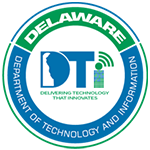 Delaware Department of
Delaware Department ofThe Honorable Gregory Lane, Chief Information Officer (CIO)
Shannon Davis, Executive Assistant
The Chief Information Officer (CIO) is a Cabinet level post and the head of the Delaware Department of Technology and Information. As such, the CIO is the key advisor to the Governor on all matters regarding technology and telecommunications. The CIO is also the primary liaison in all Information Technology (IT) matters with the Legislative and Judicial branches of State government.
The mission of the CIO’s office is to create, in collaboration with the Governor’s office and other state entities, the IT goals for the State of Delaware. Working with the Department’s management and staff, the CIO is responsible for achieving these IT goals and meeting the overall technology needs for the State of Delaware.
The following business units function under the Chief Information Office:
In conjunction with the Chief Information Officer (CIO), the Chief of Staff (COS) assists in planning, developing, and implementing the DTI Strategic Plan, and ensures the CIO’s vision and administrative agenda are carried out by the Senior Team. The Chief of Staff provides leadership, managerial guidance, and personal attention to ensure performance measures are accomplished in compliance with the Department’s, and the CIO’s, overall mission.
Major responsibilities include:
The Strategic Communications Manager oversees public communications including requests for information (excluding FOIA), press inquiries, web content, and social media. This position is the primary media contact office responsible for responding to inquiries, cultivating and enhancing collaborative working relationships with the press, agency partners and the community. Additionally, this position is primary legislative contact responsible for developing legislative proposals for the CIO and for consideration by the Governor’s office.
Major responsibilities include:
Organizational Change Management (OCM) is the organized, systematic application of knowledge, tools, and resources of change that provide organizations with a key process to achieve their business strategy. OCM aids organizations through transitions as they evolve and alter how they perform their daily business. DTI’s project management methodology is closely aligned to the Project Management Institutes PMI® PMBOK® (Project Management Body of Knowledge). Our OCM processes integrate with the project management phases associated with PMI.
Major responsibilities include:
Related Topics: Ben Parsons, Chief of Staff, Christina Dirksen, CIO, Gregory Lane, Mission, Organizational Change Management, Pam Waters, Policy, Role, Strategic Communications